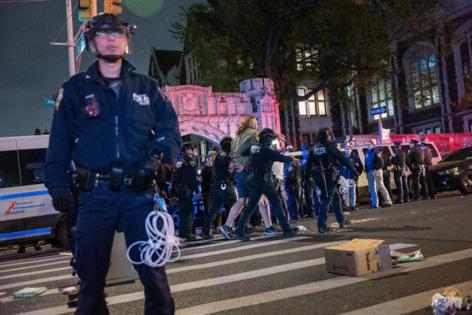Commentary: Students have the right to protest
Published in Op Eds
A disturbing trend is taking place on America’s most prestigious campuses: University presidents are wielding police as a violent threat against student protesters and the faculty who support them. This situation raises a critical question: Should the United States be a country where demonstrators can be arrested for protesting apartheid?
At Columbia University, the initial protests occurred in a designated protest zone. Protests were peaceful, nonthreatening and called for the university to divest financially from Israel. Similar sit-ins began to happen at Yale, and have now spread to universities around the country.
These protests aim to prevent universities from indirectly supporting Israel’s war on Gaza, which the International Court of Justice suggests is plausibly genocide. Jewish students actively participated in these protests, with some even observing Shabbat during the demonstrations.
Despite this, public officials have labeled the protests as antisemetic and demanded universities crackdown on protesters. President Joe Biden described the demonstrations as chaotic, despite video evidence to the contrary, and warned that violent protest is not protected.
Omitted in his condemnation were the violent acts of groups who attacked UCLA students that night before, as well as footage of police destroying school property and systematically overturning garbage cans.
This portrayal of peaceful student protesters as violent agitators is a narrative used to demonize Americans exercising their fundamental human rights. Such narratives have repeatedly been used to arrest students, assault them, suspend them and have their housing revoked.
The increasing censure of Americans whose only offense is protesting the funding of war crimes with taxpayer dollars should lead us to question the circumstances under which we are happy to discard First Amendment rights.
Officials have argued that students’ criticism of Israel and its policies, along with calls for divestment, are antisemitic. But this assertion contradicts their own standards. The International Holocaust Remembrance Alliance — whose definition of antisemitism served as the basis for a recently-passed House bill — explicitly states that anyone can criticize Israel, just as they would any other country, without being deemed antisemitic.
Since October, we have seen informal social sanctioning — such as blatant messaging around the withholding of jobs for protesters. We have also seen formal sanctions, such as the introduction of resolutions and the use of anti-boycott laws, which punish those who refuse to do business with Israel or their illegal settlements. But these laws only protect one marginalized group in America. No similar enforcement of existing laws or social sanctioning has been extended for example toward white nationalists.
Only seven years ago, universities such as the University of Florida and Texas A&M were required by law to allow racist speech because it was considered free speech. As a graduate student at the University of Florida, I experienced what it was like for neo-Nazi Richard Spencer — who called for a white ethnostate and a “peaceful ethnic cleansing” in the United States — to come on campus.
No one cared that students of color felt uncomfortable or unsafe. Instead, we were instructed informally by members of the administration to take our office hours and syllabi off the internet if we wanted to protect ourselves.
On the occasion of Spencer’s campus visit, three white supremacists who came from Texas to hear him speak drove up to students, shouted “kill them,” and began firing their weapons.
Where were the concerns from Congress then? Where were the calls for moral clarity? Black and brown citizens are told it’s allowable for white supremacists to call for our death or our forcible removal from the United States because hate speech is still free speech. Why doesn’t this same standard apply to peaceful critiques of the government of Israel?
Critique of a foreign government, its political policies and any war crimes it commits is not automatically antisemitism. Critiquing Zionism — which is a political ideology and movement, not a religion, an ethnicity or a race — is not antisemitism.
When U.S. citizens of Jewish ethnicity have been arrested and criticized as antisemitic for standing against Zionism, and groups like Jewish Voice for Peace are erroneously labeled pro-Hamas, we have to question what "Twilight Zone" episode we’ve walked into. Because by that same logic, the student protests in Israel by Israeli citizens make the Israeli people antisemitic.
Americans must push back against this second incarnation of McCarthyism before it is too late.
____
Dr. Morgan Sanchez is an assistant professor of sociology at San José State University and a Public Voices Fellow with The OpEd Project. This column was produced for Progressive Perspectives, a project of The Progressive magazine, and distributed by Tribune News Service.
___
©2024 Tribune Content Agency, LLC.







Comments